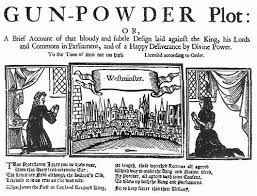Remember, remember the fifth of November. Yes, it is Guy Fawkes Day, when Brits of a certain religious persuasion celebrate – or used to anyway when religion was more to the fore in people’s minds – the foiling of the ‘Gunpowder Plot’ of 1605, when a group of Catholic conspirators planned to blow up the Parliament building with all the legislators inside, including King James I, the staunchly Protestant son of the Catholic Mary Queen of Scots, the latter having been put to death by her cousin Queen Elizabeth two decades prior, in 1587; but the injustice of which was still fresh in people’s minds.
Some of the conspirators developed qualms of conscience – since a few of said legislators about to be blown to bits were Catholic – and they sent at least one of them a warning, which was intercepted. The King’s Men searched under the building, and discovered 30 or so barrels of gunpowder in an unused, underground room, guarded by one Guy Fawkes, a Catholic soldier-at-arms who had helped mastermind the whole fiasco, ready to light the fuse and escape by swimming across the Thames.
All rather daring and, as much as I love a good adventure story, likely immoral. Guy, a robust man of red hair and commanding mien, but who in all probability looked little like the ‘masks’ seen in such Hollywood swill as ‘V for Vendetta’, was duly tortured, eventually confessed and implicated others, but escaped being hung and quartered by falling (or some say, jumping) off the scaffold and breaking his neck. Requiescat in pace.
To this day, effigies of ‘Guy Fawkes’ are burned across the Empire, calling to mind the triumph and glories of Protestant England, and the downfall of obscurantist and seditionist ‘Papism’. Or something like that.
The truth, as is usually the case, is far more complex, with religion is those days tied up so closely with politics, allegiances, culture, wars, with the fate of peoples and whole nations hanging in the balance. The ‘Reformation’ more or less destroyed what we know as mediaeval and merrie Catholic England, by practices often too brutal to describe, in an age in some ways more brutal, or, I should qualify, more externally brutal, than ours; the stakes were high.
For we have our own brutalities, more hidden and insidious, as the film Gosnell portrays, which tells the near-unbelievable barbarism of ‘Doctor’ Kermit Gosnell in his illegal, unsanitary and unprofessional late-term abortuary, where thousands of babies were killed right up to the moment of birth and beyond, in horrific ways. The powers-that-be did their best to keep his practices hidden for years, until the truth could no longer be concealed (women were dying), as they have done their best to keep this film from being watched. For the truth will set you free, even if unpleasant to watch. And Pope John Paul II declared that abortion, and other heinous crimes against life, should be seen and spoken of for what they really are.
And on culture and nations, please do feel free to peruse my latest article in Crisis, on the complex immigration question facing not just the United States – with the ‘caravan’ of would-be immigrants now swelling to 12,000 – but facing all of us in some way or another. There are no easy answers to this, and my point is not anti-immigration (I am an immigrant myself, albeit a non-willing one, as a young boy), but to suggest some questions we might ask about developing a rational policy on immigration, insofar as such is still possible.
Trudeau and his Liberals here in Canada, who seem to have little time or inclination for reason, have now promised to bring in 350,000 migrants to fill in all the ‘jobs’ that need doing. Canadians, like most post-Christian nations who have lost their religion and raison d’etre, have by and large stopped having children.
This seems to matter little to Trudeau, along with religion in any traditional sense; like most of our culture, he appears to have adopted some sort of syncretic, ‘therapeutic agnostic Deism’, a millennial quasi-religion which sounds comfy and nice, until, of course, one’s apparent ‘well being’ requires the quick and efficient removal, that is to say, the murder, of an infant, or an old and sick person; or even such evils as no-fault divorce, the disintegration of the family, the abuse of another sexually, and on it goes.
We should think about what religion we adopt, for that which is, as Saint Thomas says, the ‘master of our affections’ will colour and motivate everything else we do, and will determine our ultimate eternal destiny.
And, while we’re on the way there, we should also ponder how religion shapes our society, for it will, for good or ill. Only the ‘one, true religion’ can fully instantiate the common good, and lead not only to a fulfilled life, but to a prosperous and cohesive nation.
As Saint Paul says in today’s reading from his letter to the Phillipians:
‘fill up my joy by thinking alike, having the same charity, with one soul and mind’









